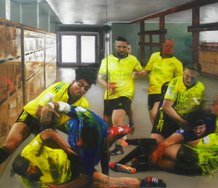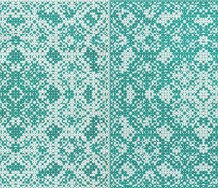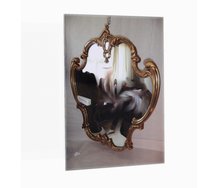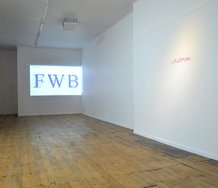Sophie Violet Gilmore – 9 December, 2013
Art schools have been a stereotypical subject of criticism in the New Zealand art scene and beyond, with some cynically arguing that they don't prepare young artists well enough for the difficulties of working in the Real World, or alternatively that they are creatively restrictive and institutional. The quality of the work at Site this year, conceptually engaged and aesthetically absorbing, confirmed for me the value of art schools for their students in developing meaningful and viable practices.
Site is the Dunedin School of Art’s annual exhibition of work by final year students. The School of Art has a vigorous presence in Dunedin’s distinctive art community, and Site is an opportunity to see Dunedin artists at a crucial stage of development. Fortunately, every graduating student is able to exhibit their work, (rather than the process of selection which happens at some art school shows), meaning that each department is well represented and that the exhibition is appealingly diverse.
In Painting, drawing and multimedia approaches work alongside actual paint. Some of these artists favour collations of small, oddly shaped canvases and frames, while in dramatic contrast, others produce enormous, rectangular works. It is interesting that the painters favour two sides of an extreme rather than negotiating an in-between scale. This may reflect a general tendency in painting today.
Cobi Taylor paints huge canvases of indiscernible subject in two works entitled Palpitate, each work a painterly mass of grey dots. The industrial, concrete ambience of the work can be seen as a contemporary revision of the pointillist approach; in Taylor’s paintings it is not luminosity, and colour which the dots create, but sombre neutrality. On the opposite wall, Anasaunoa Teofilo’s Journey 2 is an ocean of opulent blue, created through wave-like rows of hot glue dotted on the wooden surface. A sprawling body of pattern carved into the surface surges through the blue; the unconventional use of materials, and the culturally ambiguous patterns are invigorating.
Jackie Milford’s Gently Opens, Then Shuts, is an engaging example from the Electronic Arts and Photography department. In the work, a screen is contained horizontally in a wooden box, meaning the viewer gazes down into its depths. In the video, black lines and patterns jolt on top of calm watercolours that flow over the screen. The colours (as well as the title) curiously bring to mind the movements of anemones, while the patterns have a crustacean character. Milford simply transforms a screen, a mundane feature of everyday life, into something mystical.
The sculptural installation by Daniel Robins, Mono gently forces the viewers’ physical contact. The viewer walks through what resembles a maize field, placed in a clustered formation between a corridor and a gallery space. Each plant is made with a concrete base, a metal stem, and the rough, neutral-toned material of shoe insoles, which are precariously light, and sway when touched. The relationship between material and concept is charmingly perplexing as the viewer is left to wonder whether the insoles are used simply for their appearance and texture, or to serve a more symbolic purpose.
The entries from Jewellery and Metalsmithing stand out as the most exceptional of the exhibition. Brittany Sue Mason brings an ephemeral quality to stainless steel and silver in her work Fragments. Her small, oval shaped broaches resemble sea shells, fragmented with holes and scratches in a seemingly organic state of deterioration, while their clever placement on mirrors suggests the reflective quality of water on sand, on which shells are scattered by the waves. The irony is that the mirrors reflect the industrial ceiling of the Jewellery workshop rather than the sky, reasserting the pieces as the products of a purposeful human process.
Bob Mitchell’s Mongrel Alchemy was for me one of the highlights of the exhibition. Using found objects, as well as wood and bronze, Mitchell creates an eclectic body of work in which pieces of jewellery, mainly depicting animals, are interspersed with wall-mounted sculptures. A tribute to the late Ralph Hotere, featuring a charcoal portrait mounted on corrugated iron and scorched driftwood, is the central point of the display; its relation to the other works is left refreshingly open to interpretation. In a similar current of ambiguity, a quote from Nietzsche etched into a mirror proclaims: “The unbiased eye of art…in which I observed the world, life and my own soul in frightening grandeur.” The purpose of this quote may be irony, or a refusal, as the pieces produced are confidently unpretentious and dispossessed of “grandeur”. The rustic, witty and sometimes confronting works exude a sense of the artist’s identity; an assuredness which makes the prospect of future solo shows exciting. (Mitchell has since been selected to show his work in the travelling jewellery exhibition Wunderruma which will show at the Galerie Handwerk, Munich early next year.)
As in past years, part of the exhibition’s appeal comes from its display throughout the art school complex, where the viewer must weave through labyrinthine corridors, workshops, and annexes to discover the artworks. This also infuses the works with a kind of vivacious energy, as they are displayed within the place of their creation, rather than a remote gallery space.
Art schools have been a stereotypical subject of criticism in the New Zealand art scene and beyond, with some cynically arguing that they don’t prepare young artists well enough for the difficulties of working in the Real World, or alternatively that they are creatively restrictive and institutional. The quality of the work at Site this year, often technically accomplished, conceptually engaged but not abstruse, and (most importantly) aesthetically absorbing, confirmed for me the value of art schools for their students in developing meaningful and viable practices. Site 2013 was overall an optimistic and energising experience.
Sophie Violet Gilmore







 Two Rooms presents a program of residencies and projects
Two Rooms presents a program of residencies and projects Advertising in this column
Advertising in this column



This Discussion has 0 comments.
Comment
Participate
Register to Participate.
Sign in
Sign in to an existing account.